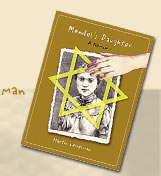

| 1. "Seichel" is the Yiddish word for sense. Discuss how Gusta defines sense and the role that it played in her life. Think about sense in terms of other characters as well, including Gusta's father, her brothers, and her cousin Chantze. 2. Gusta says to Martin "Sometimes your MEMORIES are not your OWN (p. 4)." Explore the concept of memory for Gusta and other Holocaust survivors. Also, discuss how this idea of common remembrance and shared history relates to Martin telling his mother's story. 3. Many of the illustrations include images of hands. Did you notice other recurring images or themes in Mendel's Daughter? Discuss their symbolism. 4. How does Gusta's parents' perception of the role of children differ from our contemporary American ideas? 5. Why do you think Gusta thought about saving her father and not her mother (page 104)? 6. Page 131 opens with an illustration of a tree stump and the sentence: "And so that was the story of how they killed our family." And throughout the book, Gusta calls out full names and familial relationships. Think about the significance of a family tree during the Holocaust. Does it become more important because of the loss of so many family members? 7. On page 146 the "graves", their hiding places, changed. Why? 8. Gusta's voice is accentuated through Yiddish expressions and her immigrant vernacular. Did Martin's use of language bring you deeper into his mother's world, or did you find it distracting? 9. On page 217 Gusta's family members list their fates during the Holocaust. Each one starts by saying: "Yes, this happened to me." What is the significance of this opening? Is this the first time that Martin emphasizes the truth of this story? 10. Discuss the relevance of the closing quote from the Passover Hagaddah: "In every generation, one must look upon himself, as if he personally came out of Egypt (p. 218)." Do you feel this sentiment is prevalent in today's society? 11. There are moments of unspeakable sorrow and surprising joy throughout Gusta's story. What stood out for you the most? What, if anything, did you find yourself thinking about days after you finished the book? 12. Go through the book looking only at Martin's illustrations. How effective are they in relating his mother's experiences? Are they more powerful without the words? Or, does something in the words capture the emotion more clearly? 13. Gusta is very successful at showing the painful, slow process of the Holocaust's impact on her family. Trace this agonizing course of anti-Semitism, inhumane treatment, and reversion of rights. What do you imagine was the hardest part? 14. "If only we go to America (p.25)." Gusta talks about her mother's refusal to go to America when the family had the opportunity. Knowing what happened, this seems like such a devastating missed opportunity. How do you imagine the family reconciled this choice? Do you see any of that reflected in the rest of her story? 15. Luck, superstition, and God's will all seem to play a pivotal role in Gusta's life and the lives of her loved ones. Explore these themes and their impact on the family. Compare this to the Jewish belief that "On Rosh Hashana it is written. And on Yom Kippur it is sealed. How many will be born and how many will pass away. Who will live and who will die (p. 55)." Enhance Your Book Club 1. Gusta mentions several Jewish delicacies as she recounts her childhood, such as challah, fluden and honeycake. If you have a local Jewish bakery, see if you can bring these treats to your reading group. If not, why not make some traditional foods from your own background to share with the group. 2. There are many wonderful Holocaust memorials, museums, and exhibits throughout the country. Go online to find one nearest to your group and visit it to learn of the remarkable stories from this period in history. |

